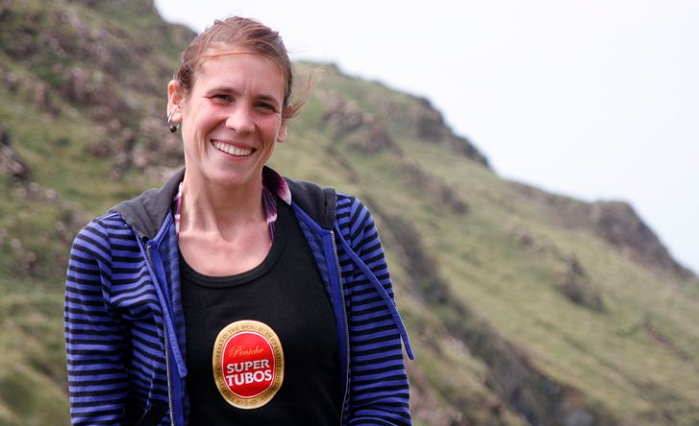Janka Penther dashes through obstacle courses that the average person would struggle to finish, surfs and competes in freestyle swimming events.
The 35-year-old struggles with cystic fibrosis, but she pushes herself to make the best of every day by celebrating what she can still do in her life. Penther said she hopes her story will inspire others who are struggling to cope with diseases or disabilities.
Just a few years ago, Penther’s own attitude about life was very different. Her lung disease was so bad that she could barely walk and could not leave her home. Penther told the Mirror that the disease made her so miserable and depressed that she almost committed assisted suicide.
The British woman was diagnosed with cystic fibrosis as a baby, and doctors told her parents that she probably would not survive childhood. But she defied doctors’ predictions and grew up to play sports in school and surf, according to the report.
As a young adult, Penther said she decided that she did not want to have a lung transplant. She said she heard about Dignitas, a euthanasia clinic in Switzerland, and talked with her parents about ending her life there when she got sicker.
“I became a member of Dignitas, paid my enrolment fee and also the annual membership fee. I spoke to everyone about it, and while my mum found it hard, my dad said, ‘Yes, when the time comes, you can come to me and I’ll help,’” she recalled. “There were three really bad winters. Firstly, I got swine flu, which had a really negative effect on my lung capacity.”
She said it was difficult watching her friends get married and have children while she was stuck in her house wondering if she would be able to get home again if she walked down the street. At that point, she said she considered whether to commit suicide in Switzerland or sign up to receive a lung transplant.
“I was too ill to even sit in the garden. All I could think was, ‘If I don’t get these lungs, I’m suffering for nothing.’ There were days when I just couldn’t face living,” Penther said.
But five little words changed her entire perspective.
Keep up with the latest pro-life news and information on Twitter. Follow @LifeNewsHQ
“There was a little voice inside my head that would say: Maybe tomorrow will be better,” Penther said.
She rejected the idea of ending her life; and in 2013, she received a double lung transplant. She said she was able to walk again and eventually even surf and compete in athletic events.
Recently, Penther amazed doctors again when she competed in a 20-mile obstacle course called the Rat Race near her home in Cornwall, England, according to the report.
“It is rare for a lung transplant patient to be able to run 20 miles. … I want to move the boundaries. I want to show other CF patients that you can overcome your difficulties,” she said.
Penther said she hopes her story will give hope to others who are struggling with disabilities or diseases.
“At 15, if I’d seen people like me now, I would not have considered suicide. But I didn’t have any idea of what life after transplant would be like,” she said. “You can do so much – and I hope that people can see that. For me, running the Rat Race is about freedom and a love for life. For someone else it’s a walk down the hill. My message is this – grab life by the horns and dare to do things.”
Penther’s message is an important one as society increasingly is encouraging people to commit suicide rather than receive treatment and support. Canada recently legalized assisted suicide, leading to nearly 1,000 government-condoned suicide deaths in the first year. In the United States, five states and Washington, D.C. now allow people to commit doctor-prescribed suicide.
Data shows depression is the most common link to these suicide deaths, not physical pain. People can forget that they are valuable when they lose their ability to walk or communicate or function as they used to. They may see their lives as worthless or a burden to others.
It should be society’s job to remind these people that they still are valuable human beings, not encourage them to kill themselves.








